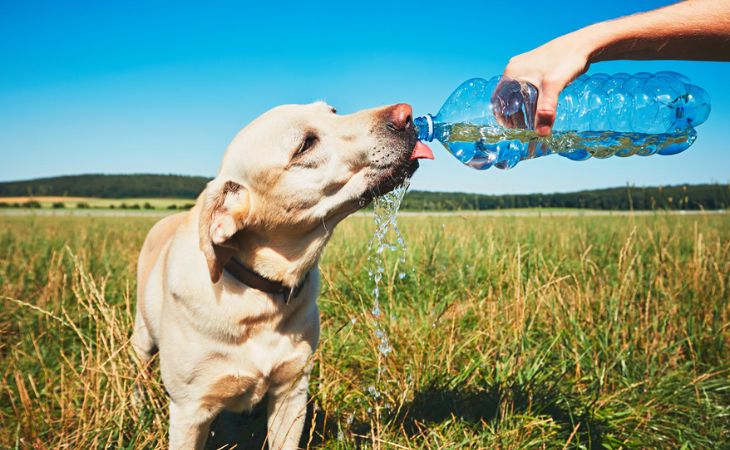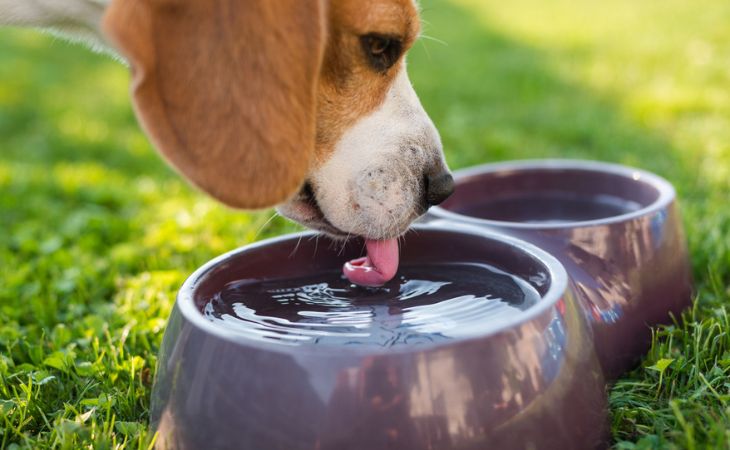When dog owners notice their dogs drinking less, it is a constant source of worry. If your dog completely stops drinking, it’s better to consult a vet immediately. If your dog still drinks, but only very little, Letsgetpet is sharing a few helpful tips and habits to adopt to get rid of this problem!
Why doesn’t my dog drink?
Since good hydration in dogs is a sign of vitality, it’s more than legitimate to wonder about both the consequences of poor hydration and its origin. By asking yourself the right questions, you’ll be able to react in the most appropriate way.
Reasons why your doesn’t drink or drinks very little
Animals are far from different from humans in this respect. Therefore, if your dog suddenly stops hydrating themself, it’s unfortunately not a good sign. The reasons for this can be either physical or psychological: an accident, heat stroke, illness, obstruction, or stress.
Whatever the reason, if your dog’s general health is degrading or you have any doubts about it, it is best to consult a vet immediately. Only a professional will be able to make the right diagnosis and rehydrate the dog by putting them on a drip. The quicker you react, the more you will be able to intervene efficiently. If you are worried about the cost of this type of care, know that many organizations can accompany you in the case of real difficulty. Talk to a professional openly about the health of your pet.
Your dog doesn’t drink as much as usual
It is important to know if your dog’s behavior seems different. Does your dog suddenly drink a lot more or a lot less? In either case, any change in your pet’s habits should set off alarms.
If you cannot find any logical reasons (medical treatments, ingestion of wet food), it may be a good idea to check your dog’s general state of health. You can even place them under increased supervision if the situation has not returned to normal on its own after 24 hours.
What are the signs of dehydration?
You may find your dog strangely quiet, seeking shade or coolness, or having the impression that they are trying to move very little. They may also pant loudly, frequently lick their lips, your skin, materials or objects, and usually keep their eyes half-closed. In the worst cases, they may stagger, be completely apathetic and no longer appear or be able to stand up.
To make sure your pet is correctly hydrated, check that their gums are salmon-colored, or that a whitish spot appears and disappears almost immediately when you press your finger on it. You can also take a fold of skin, ideally on the chest or along the shoulder, and make sure that once released, it springs back into place in less than 3 seconds.
What causes dehydration?
Highly detrimental to dogs if not remedied in time, dehydration has many causes. It can appear as a symptom of a disease such as diabetes, kidney dysfunction, mineral deficiency, neural problems, but also vomiting, diarrhea or infection with fever.
It can also be caused by other physical factors such not having access to drinkable water or exposure to the sun. Being confined in an unventilated area is also a cause. Lastly, a dog that is under a lot of stress, anxiety, or is suffering from depression, can stop eating and drinking.
This article might also interest you: My dog lost their appetite, what should I do?

Helping your dog drink more whatever the situation
Certain habits will allow you to improve the diet of your canine companion. Whether inside or outside of the house, adopt the right habits to take care of your dog’s health. You’ll also be able to avoid any risks of physical dysfunction over a short and long term.
Tips and advice
There are many tips to encourage a dog to drink enough daily. The most appreciated of canine owners by far is using a water fountain for dogs. By doing this, you are always proposing fresh and clean water. It also allows for better chlorine evaporation (if using tap water).
You can try several of these things to help your dog drink more:
- prioritize plates over water bowls (less deep and more open)
- use a fixed or heavy recipient that will not move. It could also be made of a natural material (stone or wood)
- change the water at least once per day
- don’t add any product to it and let it settle so that it doesn’t smell of chlorine
- propose different types of water: tap, rain, spring or mineral water
- show your dog an example of another dog drinking
- soak a few kibble pieces or treats that they will like
- try to coax the, by talking to them and petting them
Be patient and you will have good chances of succeeding.
Get help from professionals if your dog refuses to drink
Many dog professionals can give you advice. The best-known of them all, and the first one you should usually call on, is the vet. There are, however, other specialists who can provide quality help in solving your pet’s problem. Whether or not you have any idea why your dog is not hydrating properly, it may be worth involving other specialists.
An animal behaviorist is by far the best placed to understand why your furry friend refuses to drink. An osteopath for dogs can also help resolve any physical dysfunctions that may be preventing him from drinking properly (blocked diaphragm, displaced ribs, etc.). Depending on the situation, you can also call on the services of a dog physiotherapist or a canine Shiatsu practitioner.
Good habits to adopt for outside of the house
Many dogs refuse to drink outside of the environment that they are used to. However, this type of behavior needs to be corrected because it can put your animal in danger. During long walks or trips, it’s important for your dog to be able to hydrate themself. This is especially true during the sunniest days and hottest hours of the year.
That’s why it’s a good idea to take their everyday items with you (cushion, toys, bowls). Be sure to offer them a drink every 4 hours at most, if they don’t have access to water. Your presence and attention also play an important role, especially in times of stress. So, if during a long journey your dog persists in not drinking, offer them water directly between your clasped hands.

